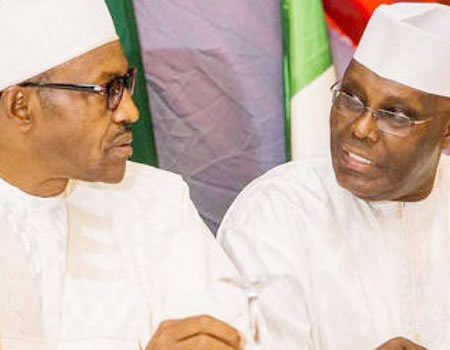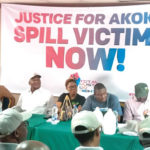After 10 days of a legal tussle between the petitioner, Atiku Abubakar of the Peoples Democratic Party (PDP) joined by his running mate, Peter Obi on the one hand, and President Muhammadu Buhari of the All Progressives Congress (APC) and the Independent National Electoral Commission (INEC) on the other hand, the Presidential Election Tribunal is inching towards giving its verdict on the winner of the February 23, 2019 election. LEON USIGBE reviews the evidence presented before the Justices, on which the parties in the conflict anchored their arguments.
President Muhammadu Buhari, his governing All Progressives Congress (APC), former Vice President Atiku Abubakar, alongside his running mate in the 2019 presidential election, Peter Obi, and the Peoples Democratic Party (PDP), are now waiting with bated breath for the outcome of the petition filed by the presidential candidate of the main opposition party against the declaration of President Buhari as the winner of the February 23, 2019 election. Atiku believed he won the election and has accused the Independent National Electoral Commission (INEC) of stealing his mandate and handing it to the incumbent. Consequently, he took his petition to retrieve the mandate to the Presidential Election Petition Tribunal hoping that justice will be served in his favour. The five-person tribunal, headed by Justice Garba Mohammed, has for weeks, presided over legal fireworks as the petitioner and the defence lawyers faced off in a titanic legal battle.
NAFDAC reiterates plans to phase out sniper from open market
Dr. Livi Uzoukwu (SAN) heads the legal team of the PDP candidate, while Chief Wole Olanipekun (SAN) leads the array of legal minds attempting to deflect missiles thrown at the 2nd Respondent’s (Buhari) victory at the poll. The tribunal has now fixed August 21 for final arguments from the petitioner and the defence counsels and possibly announce the date for the delivery of judgment.
Atiku, through his legal team, presented evidence and 62 witnesses before resting his case on July 19, while INEC, which is the first respondent in the case, closed its case through its lead counsel, Yunus Usman (SAN), without calling a single witness. Buhari’s lead counsel called seven witnesses, including the Chief of Staff to the President, Abba Kyari; Buhari’s friend and mate, Major General Paul Tarfa (retd), and Suleiman Isa Maidua, also Buhari’s secondary school classmate.
The petitioner’s witnesses included one expert, Mr. David Nyangor Njogu from Kenya, who demonstrated how the INEC allegedly transmitted the results of the election to its central server, claiming that Atiku won the election going by the actual votes cast at the election. Nyangor, a computer analyst, had been subpoenaed to testify before the tribunal on the real situation of the controversial INEC server. He also revealed that he got his information from a whistle-blower website, www.factsdontlieng.com, which was allegedly created and managed by technical staff of INEC. According to the computer analyst, the website has all the contents of the INEC server and from available information, the petitioner beat the second respondent by a margin of more than 1.8 million votes. Nyangor also gave the tribunal the Internet Protocol (IP) address of the alleged INEC server and other backend login details.
Mr. Osita Chidioka, who was also the PDP national collation agent, was the petitioner’s star witness. He told the tribunal that about N284 billion was spent in the last general election, which, according to him, was the highest spent on elections in the history of Nigeria, because of the electronic component. The former Minister of Aviation alleged that the INEC chairman, Professor Mahmood Yakubu, had told him and other stakeholders during a meeting before the elections that it would be immoral not to use electronic transmission of results after spending N27 billion on the project. He presented evidence before the tribunal to prove the alleged illegality of the INEC, security and the APC agents in the election. This claim was supported by video evidence presented by the petitioner’s counsels.
Most of the witnesses, who testified for the petitioner, affirmed the alleged illegalities perpetrated by the INEC and the security agencies, which they claimed were targeted against the opposition, including that the INEC flouted most of its guidelines in the conduct of the election mainly as it concerned the use of the smart card reader. The witnesses alleged that even though the electoral body made the use of the smart card reader a compulsory requirement in the conduct of the elections, and that in areas or units where smart card readers were not used during accreditation, elections should be cancelled in those polling units, this was not what transpired in the last general election. The petitioner’s also averred that whereas the pasting of Form EC8As at the polling units was a compulsory requirement in the Electoral Act 2010 (as amended), the results of the election at the polling units in most states of the federation were not pasted at the units as required by law, also running through the witnesses’ accounts were allegations of rampant cases of bribery levelled against the INEC officials, cancellation of votes at the collation centres against the provisions of the law and late arrival of sensitive materials, just as they also spoke of security personnel in specific states allegedly subduing voters.
The INEC, the 1st respondent in the case, elected not to call any witnesses to counter the claims of the petitioner.
The petitioner’s counsels also presented several documents and witnesses to press Atiku’s case that President Buhari lied on oath in aid of his qualification by deposing to an alleged false claim in an affidavit he presented to the tribunal. The petitioner’s counsels showed the tribunal that in the INEC form CF001, President Buhari mentioned schools that were not in existence as of the time he made the claims. Atiku averred that the President also failed to present the certificates of the institutions he stated in his forms.
Based on the evidence his counsels tendered before the tribunal, Atiku believed that he had shown substantially that the 2nd respondent and presidential candidate of the APC, President Buhari, was not duly, validly elected or not qualified to be elected as the President of Nigeria on February 23, 2019 by reasons of non-compliance with the Electoral Act 2010 (as amended).
In counteracting the petitioner’s claims, President Buhari’s lead counsel, Olanipekun (SAN), tendered 34 documents as evidence before the tribunal, which was acquiesced to but rejected by the petitioner’s corner on the grounds that they were strange. Among the documents presented by the defence to contradict the petitioner’s claims were Cambridge assessment education certified documents for Buhari in 1961, showing that he passed the exams with grade II; Cambridge assessment international education certified statements collection receipt number, CTC by WAEC showing the list of candidates that sat in 1961, group photographs of Buhari and others in 1961, print out of Evans Nigeria News publication of January 22, 2015, Certificate of compliance for the group photo of Form 6 students taken in 1961 and the printout from Evans, Commander of USA Army War College letter to Gen Akinirinade in commendation of Buhari, dated June 13 1980, and a copy of Buhari’s curriculum vitae.
With both the petitioner and the defence closing their cases, they would be hoping that they had done enough to convince the tribunal to decide the case in their favour. Just as they wait for August 21 to learn the next line of action, millions of Nigerians will be hoping that whatever is the outcome of the legal brickbats, the parties in the petition and their sympathisers will accept the verdict with great equanimity and the interest of Nigeria’s democracy would be better served.






